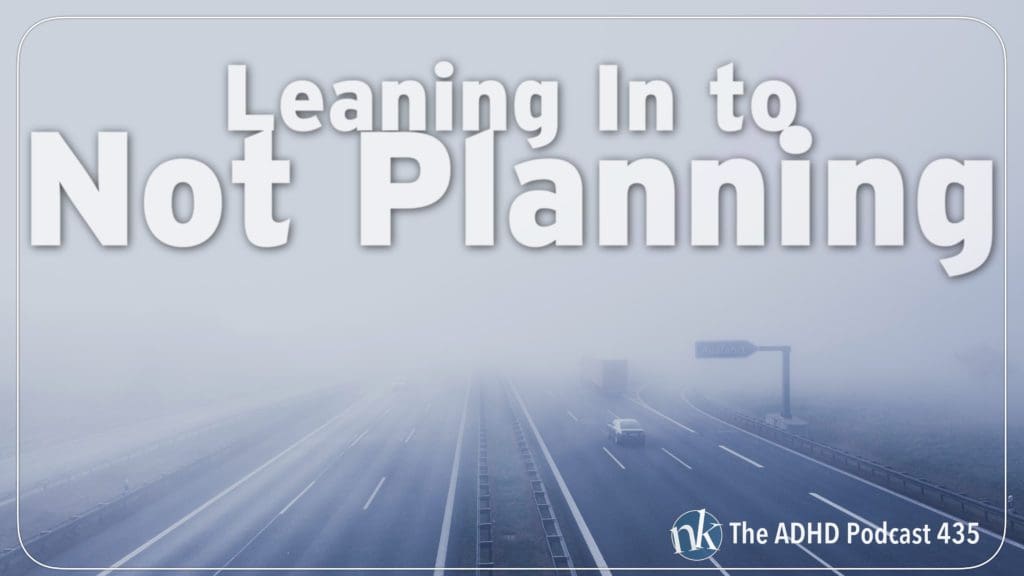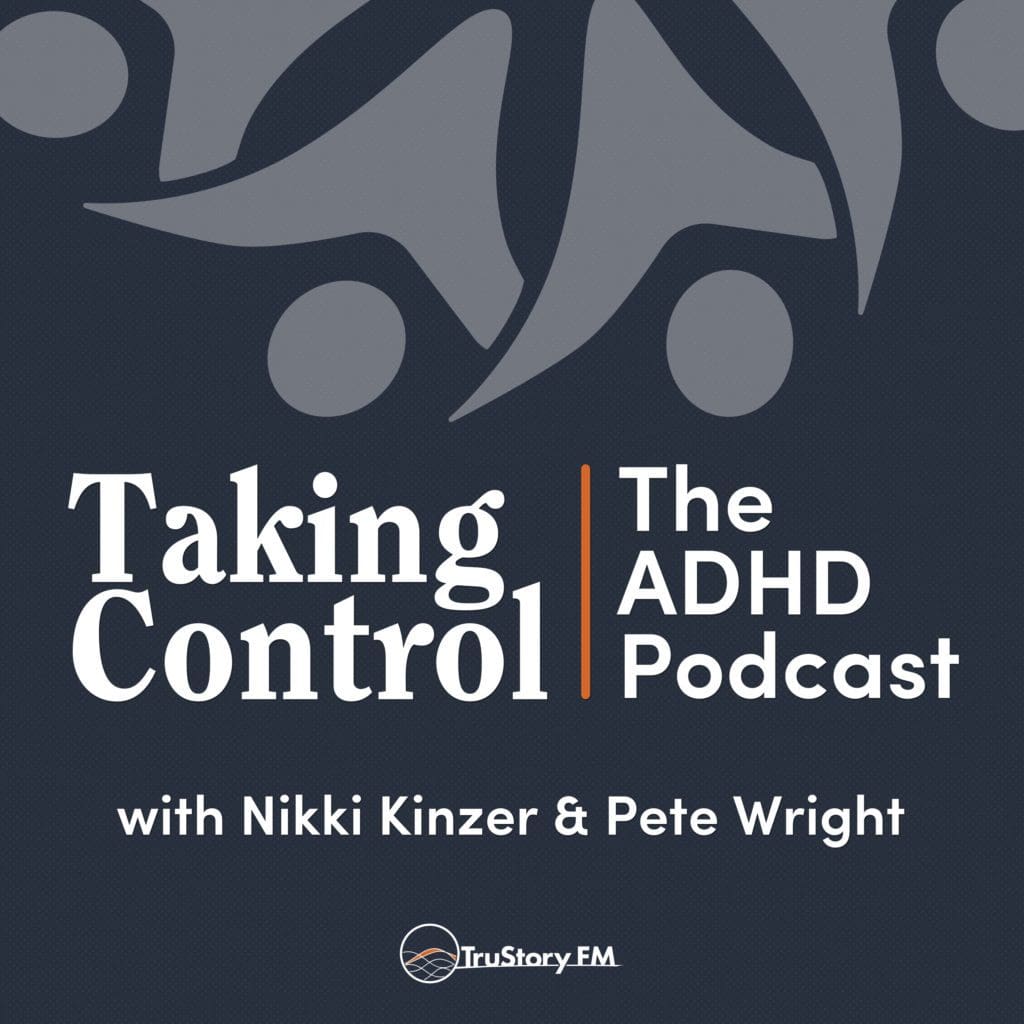We’ve been talking a lot about planning on the show and how to approach routines, breaking negative patterns, and so on over the last handful of weeks. We’ve heard the struggles and believe it when we tell you: We’re struggling too!
This week we have some thought on the hard stuff: leaning into not planning. While we likely don’t have the answers to all your questions, we do have some thoughts on short term and long term planning that should go a long way toward freeing yourself from the stress and anxiety that comes with uncertainty. Forgive yourself, adjust your expectations, and face the hard stuff as it comes.
Episode Transcript
Brought to you by The ADHD Podcast Community on Patreon
Pete Wright:
Hello everybody and welcome to Taking Control, the ADHD podcast on Rash Pixel FM. I’m Pete Wright right and I’m here with Nikki Kinzer.
Nikki Kinzer:
Hello everyone. Hello Pete.
Pete Wright:
How you doing?
Nikki Kinzer:
I’m doing pretty good. How about you?
Pete Wright:
I’m feeling pretty good. All things considered, I’m feeling pretty good. The universal qualifier of our era, all things considered, I’m feeling pretty good.
Nikki Kinzer:
It’s okay. That’s right.
Pete Wright:
We were talking a little bit more about the uncertainty of our future right now and not just the long-term future, but what do you do, say, this afternoon with your life? That has become a problem and I know it gives you fits. Are you okay? Are you going to be okay talking about this?
Nikki Kinzer:
No, I’m not okay. My anxiety is sky high.
Pete Wright:
Yeah, it’s rough out there everybody.
Nikki Kinzer:
It is. It is hard. So talk about it.
Pete Wright:
The problem is it’s all about resetting expectations, so we’re going to get into that. Before we do it, head over to takecontroladhd.com. You can get to know us a little bit better. You can listen to the show right there on the website or subscribe to the mailing list and we will send you an email each time a new episode is released. You can connect with us on Twitter or Facebook at Take Control ADHD and if this show has ever touched you or helped you make change in your life for the better, if you’ve ever found that you understand your relationship with ADHD in a new way, we invite you to consider supporting the show directly through Patrion at patrion.com/theADHDpodcast. Patrion is listener supported podcasting. With just a few dollars a month, you can help guarantee that we continue to grow the show, add new features and invest more heavily in our community.
Pete Wright:
It’s Monday, which means we just wrapped up a fantastic weekend of the brain playground. Our very own Suzanne jumped into the supreme level brain playground channel and shared an incredible variety of posts and pictures and thoughts about learning language and her dog stretching and howling. I mean it’s just a fantastic way to be a part of an incredible ADHD community.
Pete Wright:
I have a little bit of an announcement. It’s a pre-announcement.
Nikki Kinzer:
You do?
Pete Wright:
I just found out we have this merch, we have some merch that you can get. You can get ADHD podcast shirts and stuff. I just found out that our merch provider is about ready to release to launch a new product for us to put our stuff on.
Nikki Kinzer:
For us?
Pete Wright:
Yes. Would you like to know what it is?
Nikki Kinzer:
For us to [crosstalk 00:02:50]. Yes.
Pete Wright:
It’s very timely.
Nikki Kinzer:
What is it?
Pete Wright:
Very timely.
Nikki Kinzer:
A planner.
Pete Wright:
No, no. The ADHD podcast, non-medical grade face mask with the ADHD squirrels on it.
Nikki Kinzer:
Interesting.
Pete Wright:
What do you think about that?
Nikki Kinzer:
That’s pretty cute. Pretty creative.
Pete Wright:
I’m going to rock that hard. The best thing about it though is that it’s going to, for every nobody like me that buys a mask, they will donate one medical grade mask to healthcare workers, frontline healthcare workers in need.
Nikki Kinzer:
That’s great.
Pete Wright:
It is hopefully a way to give back. If you’re looking for a way and you want to rock some ADHD pod stuff, I’m going to make sure I let all of our members know first when that is available. So very cool.
Nikki Kinzer:
That’s great.
Pete Wright:
Love that T Public is doing that, so that’s it. Thanks so much everybody again for supporting the show, even in times of hardship. We could not do it without you. Patrion.com/the ADHD podcasts to learn more.
Pete Wright:
All right, Nikki, the first thing I see when I log into our shared show notes document on the fantasticcoda.io this morning is this is so hard for me.
Nikki Kinzer:
Yes, exclamation.
Pete Wright:
Exclamation point, exclamation point.
Nikki Kinzer:
Yes, it is.
Pete Wright:
Exclamation point, exclamation point.
Nikki Kinzer:
Yes. Because the title of this show, right, is Leaning Into Not Planning. How do you do that? How do you lean into not planning? It’s very difficult for me and the reason, well there’s a lot of reasons, but for one that’s what I help other people to do is to plan. I help my clients break things down and help them understand their planner and their time and we set milestone goals and all of this stuff. And I can’t do that right now because like you said earlier, we don’t even know what’s happening this afternoon. And so it’s really definitely been a time of uncertainty and it’s really uncomfortable, I’ll be honest, really uncomfortable.
Pete Wright:
Yeah, it’s really uncomfortable. And it is, I said at the beginning it’s about resetting expectations.
Nikki Kinzer:
It is.
Pete Wright:
And I did say that. And I know that I make it sound way too easy. [crosstalk 00:05:23] reset your expectations, you’ll be fine.
Nikki Kinzer:
Yeah, no problem.
Pete Wright:
We’re all fine.
Nikki Kinzer:
We’re all fine, yes.
Pete Wright:
We’re all fine.
Nikki Kinzer:
But it is true. I mean it is about resetting expectations that I think that that kind of goes into our first point with acceptance. I think that we can’t plan in the same way that we used to. We can’t plan a week ahead necessarily. So it’s difficult, but we do have to tweak this and when we were talking about this a couple of weeks ago, you and I and Melissa, we were all talking about this as a topic, and one of the things that came up was the systems too, that we have in place to just help keep our lives in somewhat control are not relevant right now. And that can definitely throw people for a loop.
Nikki Kinzer:
One of the things that I’ve seen with my own clients is there’s a very real fear that they’re going to lose what they knew before and what was happening before because they’ve been put in this situation that they weren’t expecting, this transition that they have to get used to. I’m sure there’s a lot of people out there that are probably, yeah, like I get that. I was going to the gym every day, haven’t been able to go to the gym and am I going to be able to get back onto into that habit.
Nikki Kinzer:
This is my words of encouragement is I think a lot of our systems are like as riding a bike. Right? If you ever ridden a bike in a long time, it might be a little wobbly at first. You might fall, but you’re going to get back up and eventually you’re going to catch your balance and you’re going to ride it again Pete. You are going to ride again. So believe in that.
Pete Wright:
I have a fear around that too. I have an anxiety around that too. Can I just tell you something that I feel like we talk about riding a bike as kind of an aphorism. It’s riding a bike. You’ll get it. And even now, I don’t ride a bike every day, but I can feel it in my brain and my body. If I were to get on a bike right now, I wouldn’t know what to do.
Pete Wright:
Can I just tell you, I used to be an exceptional jump roper when I was a kid.
Nikki Kinzer:
I believe that. I do.
Pete Wright:
Okay. That’s weird that you would believe. Nobody believes that about me. It’s always a thing of shock.
Nikki Kinzer:
You did the pushup.
Pete Wright:
What are you doing believing that?
Nikki Kinzer:
You did that pushup challenge.
Pete Wright:
I did.
Nikki Kinzer:
No, not to pushup, pull up. Was it the pull up or squats?
Pete Wright:
I did pushups, pull ups and squats.
Nikki Kinzer:
That’s what it was, that’s right.
Pete Wright:
It was all three. So I did all three. But the thing I’m talking about like when I was 13. I mean I could do all of it. I could do the double dutch, I could do the everything. I had the people and the two and I could jump in and I saw the Harlem Jump Ropers come and they taught us all how to do it in elementary school and it was amazing.
Pete Wright:
And I could do that and now many, many years have gone by Nikki, and I worry that there is the opposite of, oh, it’s just like riding a bike is. It’s just like jump roping because I think about jump roping and I have no idea what to do.
Nikki Kinzer:
No.
Pete Wright:
So I worry.
Nikki Kinzer:
Jump roping and riding a bike are not the same thing. You got to get that out of your head.
Pete Wright:
I know. That’s what I mean. So is it riding a bike or is it jumping rope, because jumping rope would be terrible.
Nikki Kinzer:
Jumping rope is bad, so yeah, you got to get that out of your head and focus on riding a bike.
Pete Wright:
Okay, I will. I will.
Nikki Kinzer:
I’ve never been a jump roper, but I can ride a bike.
Pete Wright:
Jump ropes are dangerous. You noose yourself up and the ones I had had the little plastic pieces, beads on them, and they would [crosstalk 00:08:59] your shins on those, you’re out for a week, like razor wire.
Nikki Kinzer:
You got to let that thought go. Just let it go. Not relevant.
Pete Wright:
How do we make sure that this is riding a bike and not jumping rope?
Nikki Kinzer:
It is probably a little bit of self-talk. It’s just reminding yourself that it’s not like a jump rope. Like, “Okay, this will pass and I will be able to get back into the things that I need to get back into to make my life feel like it’s in some kind of control.”
Nikki Kinzer:
I think for now it is asking yourself, “What do I have control over right now?” Because you do have some control over what you’re doing every day. Now you may not be able to go out except for if you live in like certain states you can. But there’s going to be … You still have, control over what you’re doing, even your home or outside your home or whatever.
Nikki Kinzer:
I think that part of it is, for me anyway, leaning into it isn’t necessarily looking at next week or even the end of the week, but staying present and really focusing on one day at a time. What is today going to look like? How do I feel today? So checking in with yourself. Are you anxiety? Is your anxiety high? Are you okay? Are you content? Are you tired? How do you feel? What’s important today? If it’s a work day, what’s important to get done? But we’ve got to lower those expectations. I think the expectations are way too high. We are in a pandemic and productivity is not at its peak. And so we need to relax a little bit on that.
Pete Wright:
That’s right. I think it’s important that we break down the difference between short-term and long-term planning. For anybody who is still working from home struggling with trying to figure out what is their place and purpose in their business, to figure out what’s going on when so many of our projects are longer term. How do you figure out what’s next? What is the next most useful thing for you to do?
Pete Wright:
Generally when we’re not thinking about COVID, short-term goals are those that are typically accomplished in a few weeks or a few months. That’s what we’re thinking about when we look at our horizons of authority and accountability over our activities and projects.
Pete Wright:
Long-term goals are those that are targeting a year or more in the future. And so in COVID we have to at least adjust our scale a little bit. Does this mean changing what our goals are? Maybe, but, and I think this is the most important thing, maybe not. Just because the context has changed around how you’re doing your work, does not always mean you have to change your focus on what you’re doing over the long-term.
Pete Wright:
That gives me a lot of hope. That gives me a lot of promise that there is some sense of normalcy out there that I can at least latch on to.
Pete Wright:
Short-term has to move from thinking in terms of weeks and months to thinking in terms of hours and days. We have to take the micro activities that we’ve already broken down, to take the bigger projects and break them down. We break them down into like what is this? We have to really rethink the units of work that we can accomplish over a course of hours. And maybe it’s now nano activities. Maybe just sending one email is enough. That’s all you can do, because we have to know that we’re adaptable to the changing conditions in the world and be super flexible to the people that we’re working with, knowing that they’re also struggling to adapt and to change and to be flexible themselves.
Pete Wright:
There’s just a lot of understanding that we have to have here as we try to move things forward. I think about our schools. I think they really make a great case example for this, because many of our schools who are adapting to online learning are moving from thinking about semesters or quarters or terms to thinking about just like two weeks. Can we teach our teachers some new skills, get them delivering some new skills and some new content to our students and let’s reevaluate how we’re doing every two weeks.
Pete Wright:
That makes it really hard to think about things like infrastructure and maintenance and planning on our buildings and things that we thought were going to be on the docket for this year, but it doesn’t change how important those things are in the long-term. It just changes how we’re going to be doing them.
Pete Wright:
We talk about projects being back-burnered and I hate that term. I hate that term because it puts them on a list of forgotten things.
Nikki Kinzer:
It really does.
Pete Wright:
I really prefer that if you’re going to drop a project, drop the project. If it’s uncertain or if its delivery date is now sort of indefinite, then say it has been extended. But please stop saying back-burnered because back-burnered changes the way you think about the project. It makes it less important.
Nikki Kinzer:
For sure.
Pete Wright:
And in this case, we need those projects to be important, unless they’re legitimately not important.
Nikki Kinzer:
Then put them off the burner altogether.
Pete Wright:
Then be done with them. Exactly. What do you think about all that, this whole short-term-long-term thing? What do you think about how I pitched that?
Nikki Kinzer:
I mean I think it’s really a good way of looking at it and adjusting to it, for sure, and some great examples, especially with the schools and the projects. I like that. That’s good.
Pete Wright:
Well, I mean I guess I come at this from my client’s side projects, which are things that I thought I was going to be doing right now, I’m not doing, but that doesn’t change the fact that they’re still going to get done. I’ve had very few projects just get dropped. They’ve been extended, they’ve been changed but they haven’t been dropped. And I think with this comes a sense of creativity that we have to develop. How are we going to continue to move even those long-term projects, which are now longer term projects, how do we continue moving them forward even in a state of such foggy uncertainty? That’s a big deal.
Pete Wright:
I’ve been thinking though a lot about our individual projects, our individual, like our home and the things we’re trying to accomplish in our personal lives through all of this and I mentioned the brain playground earlier. I think Suzanne is a great example of this, just with all of the incredible language learning that she has educated us on over the course of her last several brain playgrounds. That really defines how you can continue to work forward and the things that are important to you personally and how you can learn lessons from your experience with COVID. I am such a huge advocate. I know we’ve talked about it on the show before this the idea of journaling, but really how are you using journaling for self care? How are you using your documentation of your experience to help you learn things that are going to stick with you, that are illustrative of this experience that you’ll be able to take when the world changes again? Because the world’s going to change again.
Pete Wright:
Some of the stuff you learn and do now are going to stick with you and they’re going to stick with all of us. I think we can take time to be present with that. I think it goes into the self care kind of model.
Nikki Kinzer:
Absolutely. Well because we are in such a surreal moment of our lives that I think documenting it is really an interesting, it will be really interesting to reflect and look back on later, that this is what was happening, this is what we were going through, this is what we were thinking. I just think there’s a lot of value in that, and like you said, really important lessons to learn from.
Pete Wright:
Our whole family has been doing daily journal practice for her, and we’ve been dating our posts as like day 40. But I think that the questions that I’ve started posing to myself and I make this not as a recommendation to others. You sort of have to figure out what you want to do for yourself. But what I’m asking myself is what changed today over yesterday? What is different today that I tried something new or did something different today that I didn’t do yesterday? What’s tomorrow going to look like? What am I going to try to accomplish? I still ask the question, what am I going to ship today? What are the things that I’m going to do, finish, release to the world, deliver to a client? What am I going to ship? What would I like to be doing this time next month?
Nikki Kinzer:
That’s a hard question to answer.
Pete Wright:
It is a hard question to answer, but you know what? It becomes the further out you go, the easier it becomes to answer.
Nikki Kinzer:
Yes, because I could definitely … Because your next question is what would I like to be doing in two years? And I could answer that.
Pete Wright:
But if you go back and look at the other questions that where I start, like what changed today versus yesterday, what’s tomorrow going to look like, and then you go back and read what I was writing 30 days ago, you can start to build a trendline of those thoughts and dreams and wishes and aspirations and projects that are going to lead me to what’s going to happen next month? I’ve got two new podcasts for new clients that I’m planning on launching by the end of May or the first week of June. And those are things that I’m actively working on right now that didn’t exist 30 days ago. But because of changes that I made then I’ve been able to move these things down the field a little bit, which feels incredibly good.
Nikki Kinzer:
Well, and that actually, I mean was going into my next point, is the self care. This is not a time to not be focusing on that. And so I think that the journaling is definitely something that we can do, anything that’s going to ease your anxiety and stress. I’ve been meditating more, making more of a point to do that, just to stay grounded. Any kind of self compassion I think is really important. Nothing is normal right now.
Nikki Kinzer:
We’re going to have Michelle, Dr. Michelle Frank on the show in a couple of weeks and she’s going to talk about … It’s still kind of squirrelly on how we’re going to talk about this, but I want her to kind of talk about that comparison factor of where that pressure is to be productive. And when you see or you hear of somebody getting all this stuff done and you don’t feel like doing any of it, where does that leave us? I’m really interested to hear what her perspective is on that. And I think it all goes into self care, how you’re taking care of yourself, adjusting.
Pete Wright:
What are your clients like? What are your clients seeing? Because I think about this in terms of now we’ve been doing this for a month and a half. Do you get the sense that anybody is getting good at this yet, like feeling actually comfortable with the experience?
Nikki Kinzer:
Of self care or getting good at …
Pete Wright:
Like taking care of themselves, doing the things that they need to do to keep this going, or are we still just in a period of uncertainty? Because I know it’s going to … This is like any other muscle. We’re going to adapt one way or another, we have to.
Nikki Kinzer:
It goes in waves. That’s what I’ve noticed is that the first week or two there was kind of a panic of how’s this going to work? I’m really concerned about a lot of different things. And then there was sort of this, okay, everything’s all right. But now we’re kind of going into this almost depression, not anxiety, but it’s more of just like, “I’m so tired of it.”
Nikki Kinzer:
I heard on the news today, it’s like this quarantine fatigue and that’s why you’re seeing people going out anyway because they’re tired of it, which can be really dangerous too. I think that nobody really knows what to do in this situation, but that’s what I’m finding is that it goes in waves.
Nikki Kinzer:
So next couple of weeks people might be okay. I have noticed that most of my clients, they’ve had to adjust what their self care looks like, but some of them are getting more sleep, some of them are at least going out and walking and exercising outside. But everything looks different. I mean everything.
Nikki Kinzer:
The thing that’s really cool though about ADHD, and I think you can probably attest to this Pete, is that ADHDers are great in crisis. The adrenaline comes up and they can get the things done that they need to. A lot of my clients will say, “This is how we live our life every day.” They’re just getting an idea now of what this looks like or feels like. So many of them I think are still very much staying very strong. But just like everybody, it’s tough.
Nikki Kinzer:
You’ve asked about my clients. To give you an example, I have a client who had a lot of different goals this year that she wanted to accomplish and a lot of those goals had to do with being outside of her home. They were health goals, they were marathon goals, they were working with a trainer. I mean all of these different things that she wanted to do and now she can’t even go outside because she has asthma and she’s at high risk. And so a lot of this and she’s by herself, she’s living by herself. And so it’s hard.
Nikki Kinzer:
One of the things that we had to do was really adjust how we were going to work together because we really didn’t have anything to update with her goals because they were pretty stagnant right now. Her work was busy, but she was getting by and was fine and they were working everything out.
Nikki Kinzer:
What we ended up doing was adjusting, because one of her goals was to organize her house or to get rid of clutter in her house. And so that’s what we are focusing on now is … And she doesn’t have the motivation. I just want to be very transparent about this. This is what we’re working on, but she doesn’t have any motivation to do it. And so we’re really taking baby steps to do it. So there’s a couple of rooms that need to be done and we’re just like, “Oh let’s just get everything in one corner. Let’s take one little piece of pile of paper and let’s just think about it for a little bit.” I mean we’re really going into baby steps.
Nikki Kinzer:
So there’s no pressure. So I don’t want people to think, “Oh we’re like got this like huge organizing project out there,” because that’s not what it is. We’re adjusting and we’re being very realistic about it. It still gives her something to look forward to. It still gives her some kind of accomplishment, but it’s not shameful. It’s not where she’s going to feel bad or the expectations are set high. Does that make sense?
Pete Wright:
Well, and that’s what you’re doing like right? You’re doing what we’re talking about, breaking down even the smallest things into smaller things.
Nikki Kinzer:
Really small things.
Pete Wright:
Really.
Nikki Kinzer:
Really small.
Pete Wright:
There’s nothing like a change in the world to make you reevaluate the scale at which you have to work.
Nikki Kinzer:
Yes.
Pete Wright:
And that’s what we’ve had here. I thought I knew what the smallest order of work element was for me. I did not know what that smallest element of work was.
Nikki Kinzer:
No.
Pete Wright:
And now I do, and it’s sometimes comically small, but it’s all I can do to keep moving. And if we can learn anything from this show and from Dory, you have to just keep swimming.
Nikki Kinzer:
You do. You have to keep swimming.
Pete Wright:
Don’t stop swimming.
Nikki Kinzer:
That’s it. That’s it. I mean, we don’t have the answers to this. I wish I did, but this is what I’m doing. This is what you’re doing. This is what I’m seeing people do. And like you said, we’re doing the best we can and we just keep swimming.
Pete Wright:
Just keep swimming. That’s what we got for this week everybody, and I hope that’s helpful just in terms of rethinking what it means and adapting to the sort of new work environment. On the livestream, I changed my background to foggy woods.
Nikki Kinzer:
I like that.
Pete Wright:
Because how do you plan on the other side of those foggy woods?
Nikki Kinzer:
You can’t.
Pete Wright:
I can’t plan for that.
Nikki Kinzer:
But you know what? I hope that when you get through that fog, it’s going to be like this beautiful sky, open fields.
Pete Wright:
But you know what else I love about this picture, is that it’s kind of beautiful anyway.
Nikki Kinzer:
It is. It is, I agree.
Pete Wright:
Be careful because everything in there is sick so wear a mask.
Nikki Kinzer:
Wear a mask. That’s right. Protect yourself.
Pete Wright:
Thank you everybody so much for hanging out with us this fine day for the live stream. For those who download and listen to the show, thank you too. We sure appreciate it. On behalf of Nikki Kinzer, I’m Pete Wright and we’ll catch you next week right here on Taking Control, the ADHD podcast.











